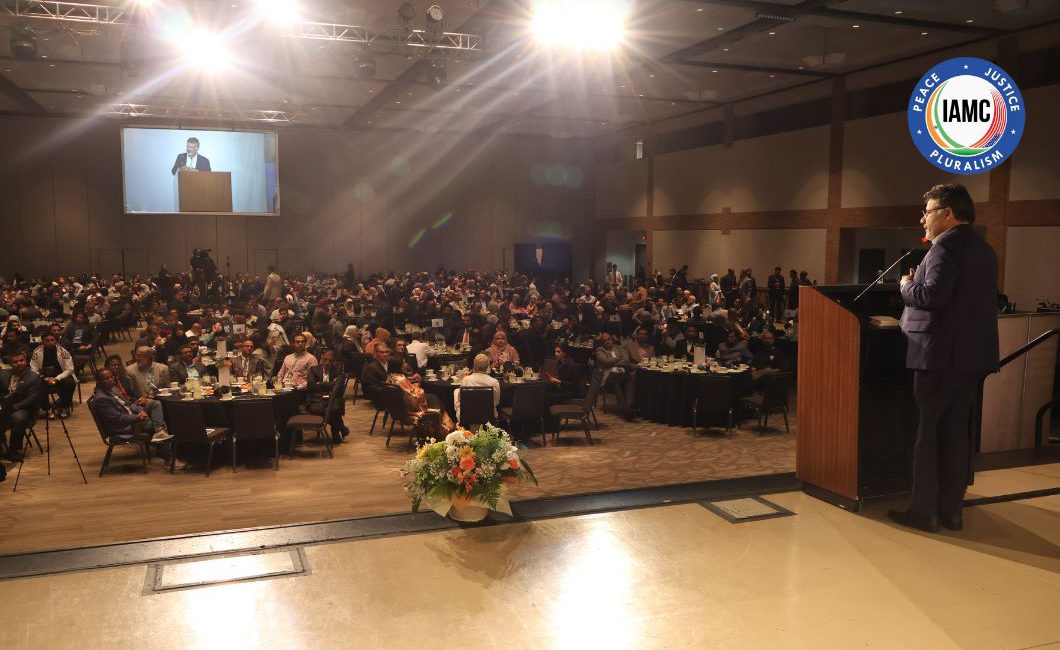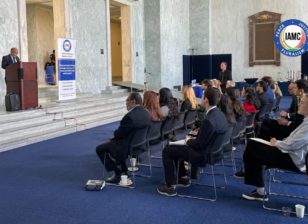Indian American Muslim Council Convenes Widely Attended National Convention in Texas
Plano, Texas (October 18, 2023) — On Saturday, October 14, the Indian American Muslim Council hosted its annual convention, anchored on the theme of “Upholding Democracy and Human Rights: A Global Call to Action.” The event was convened at the Plano Events Center in Plano, Texas, and saw over 1,000 attendees.
In addition to a full day of panel discussions on human rights in India and the US, the event featured a wide-ranging bazaar with local vendors selling South Asian apparel, as well as Islamic art, books, children’s toys, and even solar panel installation services. Also included in the bazaar were book displays on the global persecution of Muslims, the increasing presence of Hindu far-right nationalist groups in the United States, and young adult fiction. Anchoring rows of tables was a candle-light memorial kept burning all day with the names of victims of anti-minority attacks in India superimposed on the famous India Gate in Delhi.
Panels convened throughout the day to offer convention participants the opportunity to learn about conditions that Muslims, Christians, Dalits, and other persecuted minorities are facing in India, the rise of Hindu nationalist groups in India and the United States, and the need to organize across faiths in order to present a united front against India’s ruling Hindutva (or Hindu nationalist) party, the Bharatiya Janata Party. According to The Guardian, Hindutva is rooted in Hindu supremacism, an ideology that aims to transform India into the Hindu Rashtra (nation) where Muslims and Christians are reduced to second-class citizens and Hindus enjoy higher status.
After a rousing prayer led by Plano’s own Dr. Zafar Anjum, Imam at Colony Masjid, Shaikh Omar Suleiman delivered the convention’s keynote address.
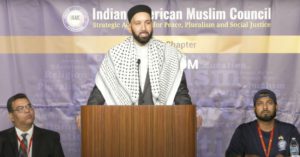
As Founder and President of the Yaqeen Institute for Islamic Research, Shaikh Suleiman emphasized the need to rise together as a community in order to combat rising threats to Muslim lives in India, Palestine, and other countries. “Once the world’s largest democracy, India now stands as a model of oppression,” Suleiman said. “But what we possess in faith is stronger than what they possess in war machines.”
After celebrating the contributions of both the Sikh and Hindu communities to oppose the persecution of Muslims in India, Suleiman encouraged attendees “not just to listen to speeches, but to sign up for work. We need workers and volunteers. May Allah allow this to be a moment in which we form a movement here in Dallas to oppose fascism in India.”
Following Dr. Suleiman’s address, the IAMC convened the second annual Human Rights and Religious Freedom Journalism Awards, celebrating the best in Indian human rights journalism. IAMC Executive Director Rasheed Ahmed discussed the dire state of Indian media under the Modi regime, where news organizations are routinely raided and their editors arrested. “It is hard to think of any time when independent Indian media have been more in danger. As against these threats, the perseverance of today’s award winners is especially impressive and necessary,” said Mr. Ahmed.
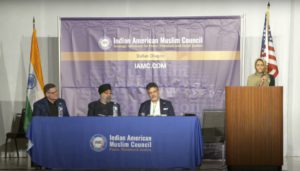
Convention attendees then enjoyed a banquet lunch and socialized in the bazaar area. Participants in the convention youth summit gathered in another room to discuss organizing strategies for building resilient networks of resistance among the next generation of activists.
The following panels convened after lunch: “Interfaith Leaders in Action: Social Justice Beyond Dialogue”; “Upholding Democracy in India: 2024 Election and its Impact”; and “Unveiling the Shadows: The Impact of Hindu Supremacy on Women”.
At the Interfaith Leaders in Action panel, IAMC Associate Media Director Safa Ahmed welcomed Azhar Azeez, Former President of the Islamic Society of North America, Manmohan Singh, the Chair of Sikh Council for Interfaith Relations, and Pastor Bob Roberts Jr, Co-Founder of Multi-Faith Neighbors Network.
Each shared their thoughts on reaching out across faiths and the challenges of doing so. Singh discussed how he had been shouted at for participating in Interfaith panels with Muslim women at the 2023 Parliament of World Religions, and how “the next generation needs to learn both to respect freedom of speech” and “develop tools to protect themselves.” Pastor Bob Roberts noted how Indian Christians were threatened by rising “authoritarianism and tribalism” and emphasized the need to “keep weaving baskets of community.”
At “Upholding Democracy in India: The 2024 Election and Its Impact” panelists SQR Ilyas, father of imprisoned Muslim activist Umair Khalid and IAMC’s Advocacy Director Ajit Sahi discussed the upcoming Indian election. Ilyas pointed to the inspiring example of the recent Karnataka elections: “Muslims decided to come together to vote the BJP out of power. They decided to back one party and put aside their differences.” Ajit Sahi emphasized the need for the opposition party must “Foreground the economic failures of India’s Hindu Nationalist prime minister. Their development victories are a ruse. If they do this, they will sweep the elections.”
At “Unveiling the Shadows: The Impact of Hindu Supremacy on Women” panelists Dr. Yasmin Saikia, Hardt-Nickachos Chair in Peace Studies at Arizona State University, and scholar Dr. Samina Salim discussed the threats posed to women by India’s Hindu nationalist government.
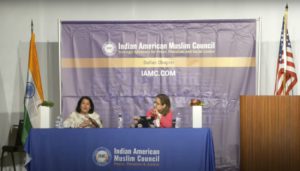
Panelists pointed to the example of the protests led by women wrestlers, who allege that BJP leader Brij Bhushan Sharan Singh molested and groped them at national conferences. “Degrading women, especially women, is at the core of the Hindu nationalist program. Employment of women is denied by the BJP,” said Dr. Yasmin Saikia. Other panelists pointed to the oppression experienced by Muslim women who have been banned from wearing hijabs in school.
The final panel included “Hindu Nationalism & Islamophobia: A Contemporary Analysis,” featuring Dr. Khaled Beydoun, Author & Legal Scholar; Dr. Sabreena Ghaffar-Siddiqui, Professor and Researcher; and Dr. Sahar Aziz, Professor, Author of the Racial Muslim.
The evening segment included a moving play by IAMC volunteers on the importance of putting aside religious differences and coming together to form one harmonious, pluralistic India.
IAMC leaders recognized and celebrated four outstanding individuals for their remarkable dedication and contributions to human and civil rights. Among the honorees were Omar Suleiman, recipient of the Maulana Mohammad Ali Jauhar award, Dr. Sahar Aziz, honored with the Begum Hazrat Mahal award, Dr. Khalid Beydoun, who received the Tipu Sultan award, and Dr. Angana P. Chatterji, recognized with the Kulsum Sayani award.

Later, California Congressman Ro Khanna spoke via Zoom stating that he “deeply appreciates the work of the Indian American Muslim Council,” and praised its executive director Rasheed Ahmed for his tireless advocacy for human rights.

